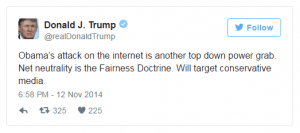FCC points net neutrality finger at AT&T
The FCC has written to AT&T SVP Robert Quinn to cast a shadow over the telcos plans to offer DirectTV as a zero-rating proposition, citing net neutrality concerns.
November 11, 2016

The FCC has written to AT&T SVP Robert Quinn to cast a shadow over the telcos plans to offer DirectTV as a zero-rating proposition, citing net neutrality concerns.
The practise of zero-rating, a telco offering services that do not count against a customer’s data usage plan, has become increasingly common in recent months, as companies aim to capitalize on more data focused mobile contracts. Virgin in the UK is another recent example, as it now offers a zero-rating proposition for WhatsApp and Facebook data usage.
The FCC’s concern here is surrounding net neutrality, another new development (new in context) which has caused conflict in the industry. Should companies have the opportunity to offer zero-rating services to customers it would, in theory, offer an advantage over competitors, which regulators are keen to avoid in a crusade to utilities and democratise the internet.
“Based on public reports as well as information you have provided to us, the Wireless Telecommunications Bureau believes that the terms and conditions under which Sponsored Data is offered to content providers unaffiliated with AT&T, combined with AT&T’s current practice of zero-rating DIRECTV video applications for AT&T Mobility subscribers, may obstruct competition and harm consumers by constraining their ability to access existing and future mobile video services not affiliated with AT&T,” the FCC said in a letter to AT&T.
Net neutrality is an area which is now proving to be increasing complicated due to the difference in opinion between Democrat and Republican Commissioners at the FCC, and the FCC’s inability to maintain consistency in its decision making. T-Mobile in the US has been offering free data for music and movies, while Verizon’s Go90 app is also zero-rated. Apparently AT&T has crossed a currently undefined line and got on the wrong side of the chaps at the FCC.
The contradictions in rulings should not necessarily be anything which surprises the industry, as the FCC hasn’t got its own house in order currently. Considering Commissioners sit on both sides of the political fence, disagreements are going to occur, though net neutrality is one which is causing a stir. Democrat Commissioners Mignon Clyburn and Jessica Rosenworcel are pro net neutrality, while Republican Commissioners Ajit Pai and Michael O’Rielly are against.
Speaking on a decision made the US Court of Appeals for the District of Columbia Circuit, which supported the FCC’s current net neutrality rules, O’Rielly said, “If allowed to stand, however, today’s decision will be extremely detrimental to the future of the Internet and all consumers and businesses that use it. We all will rue the day the Commission was confirmed to have nearly unmitigated power over the Internet — and all based on unsubstantiated, imaginary ‘harms’”.
While the internet and mobile communications may have been normalized in the day-to-day lives of consumers, the reality is the technology is still in its infancy. Bearing this in mind, regulation and legislation is still playing catch, trying to figure out what is right, what is wrong, what is right but could be wrong and what is wrong but could be right. It’s a minefield of political seesaws, and current legislation does not support the advanced stages of technology currently.
Considering the advancement of technology is only getting faster, this is unlikely to be the last time the industry witnesses such a contradiction or a change in legislation. Should the FCC have its way and shoot down the AT&T zero-rating offer, it will be interesting to see whether this sets the Commissioners on a warpath to take down other zero-rating propositions, but also  whether the ripples of change make their way across the Atlantic and influence zero-rating in the European markets.
whether the ripples of change make their way across the Atlantic and influence zero-rating in the European markets.
Back to the hot topic of the week, the US election. This could also have a significant effect on the net neutrality argument in the US. While Trump has not explicitly come out with his official position, he would seem to be favouring the ISPs (see tweet image), and the change in administration could see a change in sentiment. How long Trump and co. will be happy with a Democrat in charge of the FCC remains to be seen, however a change in leadership could see a change in the FCC’s stance on net neutrality.
All-in-all, the FCC doesn’t appear to be on friendly terms with AT&T at the moment, though whether this is a short-term tiff could all depend on leadership decisions over the next couple of months. Can AT&T hold its breath long-enough to wait for a Republican stance on net neutrality?
About the Author(s)
You May Also Like








.png?width=300&auto=webp&quality=80&disable=upscale)


_1.jpg?width=300&auto=webp&quality=80&disable=upscale)


.png?width=800&auto=webp&quality=80&disable=upscale)